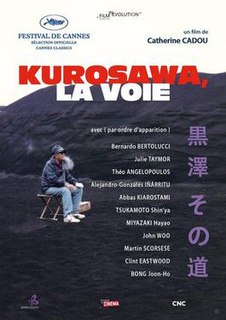 W
W3.11: Surviving Japan is a documentary film about the 2011 Tōhoku earthquake and tsunami and the Fukushima Daiichi nuclear disaster in Japan written and directed by volunteer and resident Christopher Noland.
 W
WArakimentari is a 2004 American film directed by Travis Klose. It is a documentary film about acclaimed and controversial Japanese photographer Nobuyoshi Araki. The film looks at Araki's personal life as well as his art.
 W
WBeetle Queen Conquers Tokyo is a 2009 documentary directed by American filmmaker Jessica Oreck. The documentary shows how insects are entwined with Japan from past to present. A Japanese narrator reads poetry, reads legends, and give information about the insects. The film has shots of insects interspersed with shots of daily life in Japan. It has to do with how the Japanese treat insects of all types.
 W
WThe Birth of Saké is a 2015 documentary film about the Tedorigawa Brewery, a 144-year old sake brewery in Ishikawa Prefecture. The Birth of Saké documents the painstaking process of traditional, craft saké brewing that lasts throughout the winter.
 W
WThe Departure is a 2017 American documentary by Lana Wilson. It concerns suicide in Japan. The film premiered at the 2017 Tribeca Film Festival in New York. It was nominated for a 2018 Independent Spirit Award for Best Documentary.
 W
WDiaoyu Islands - The Truth is a documentary film produced by Chris D. Nebe and J.J. Osbun of Monarex Hollywood Corporation and directed by Chris D. Nebe that tells China's side of the Diaoyu/Senkaku Islands dispute with Japan. Diaoyu is the Chinese name for the islands, which are known as Senkaku in Japan.
 W
WFinal Straw: Food, Earth, Happiness is a documentary/art film released in June 2015 that takes audiences through farms and urban landscapes in Japan, South Korea, and the United States, interviewing leading practitioners in the natural farming movement. The film—inspired by the work of Masanobu Fukuoka, and his book The One Straw Revolution—came about when an environmental artist and an environmental book editor had a chance meeting in Seoul, South Korea, and began conducting short interviews together with leaders in the ecology and social justice movements. During an interview with Korean farmer Seong Hyun Choi, the two were so impressed by his ecological mindset and way of working that they set out to produce a feature film about the wider natural farming movement in Japan and Korea. Lydon and Kang ended up quitting their jobs, giving away most of their possessions, and becoming voluntarily homeless for four years in order to afford producing the film.
 W
WHafu: The Mixed-Race Experience in Japan is a 2013 Japanese documentary film that explores the intricacies of mixed-race, ethnically half Japanese people called hāfu and their multicultural experiences in modern Japan. The film featured hafu people share their experiences. Such as those who've lived their whole life in Japan. Or those who arrived later in life and others are in between. The contrast between Japanese and other cultures can be akin to two different worlds. It sheds light on what it is like to be multiracial and multicultural in a homogeneous Japan. It seeks to answer the question what does it mean to be hāfu? What does it mean to be Japanese, and what does it mean for Japan?
 W
WThe Inland Sea is a 1991 American travel documentary directed by Lucille Carra. It is inspired by the 1971 travelogue of the same title written by Donald Richie. In the documentary, filmmaker Carra undertakes a similar trip across the islands of Japan's Inland Sea as Richie did twenty years prior. Donald Richie narrates the film.
 W
WKurosawa's Way is a 2011 French documentary directed and written by Catherine Cadou. The film features 11 major filmmakers from Asia, America and Europe as they discuss how the films of Japanese director Akira Kurosawa influenced them.
 W
WKusama: Infinity is a 2018 American biographical documentary film that chronicles the life and art of Japanese contemporary artist Yayoi Kusama, now one of the best-selling artists in the world, who overcame sexism, racism, and a stigma of mental illness to achieve international recognition relatively late in her career. Magnolia Pictures released the film on September 7, 2018.
 W
WOur School is a documentary film about the lives of ethnic Korean students in a Chongryon-run pro-North Korean high school in Hokkaido, Japan. Released on 29 March 2007 (Sunday), a Hankook Ilbo article on 3 April stated it had already exceeded 10,000 viewers. In the end, media reports claim it registered 85,000 or 90,000 viewer admissions in the South Korean domestic market, a far better performance than other recent documentaries such as the 2002 Yeongmae, the 2004 Repatriation or the 2006 Bisang ; it was suggested this might be a new domestic record. Director Kim Myeong-joon received the Kim Yong-gun Memorial Society prize in relation to his work on the film.
 W
WQueer Japan is a 2019 documentary film directed, edited, and co-written by Graham Kolbeins. The documentary profiles a range of individuals in Japan who identify as lesbian, gay, bisexual, transgender, and queer (LGBTQ). Queer Japan is produced by Hiromi Iida with Anne Ishii, written by Ishii and Kolbeins, and features an original score composed by Geotic.
 W
WShinjuku Boys is a 1995 film by Kim Longinotto and Jano Williams. It explores the lives of three transgender men who work at the New Marilyn Club in Tokyo, Japan.
 W
WThe Tsunami and the Cherry Blossom is a 2011 documentary film directed by Lucy Walker. The film was nominated for the 2012 Academy Award for Best Documentary.